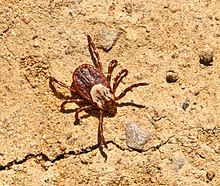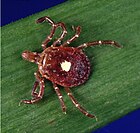Dermacentor
| Dermacentor Temporal range:
| |
|---|---|

| |
| Scientific classification | |
| Kingdom: | |
| Phylum: | |
| Class: | |
| Subclass: | Acari
|
| Superorder: | |
| Order: | |
| Family: | |
| Genus: | Dermacentor |
| Type species | |
| Dermacentor reticulatus (Fabricius, 1794)
| |
| Synonyms | |
| |
Dermacentor is a genus of ticks in the family Ixodidae, the hard ticks. The genus has a cosmopolitan distribution, with native species on all continents except Australia. Most occur in the Nearctic realm.[2]
Hosts of Dermacentor ticks include many large and small mammals, including horses, deer, cattle, lagomorphs, peccaries, porcupines, tapirs, desert bighorn sheep, and humans.[2] The American dog tick (D. variabilis) is a member of the genus.[3]
Dermacentor species are vectors of many pathogens, including Rickettsia rickettsii, which causes the disease Rocky Mountain spotted fever, Coxiella burnetii, which causes Q fever, Anaplasma marginale, which causes anaplasmosis in cattle, Francisella tularensis, which causes tularemia, Babesia caballi, which causes equine piroplasmosis, and the Flavivirus that causes Powassan encephalitis.[2] Dermacentor ticks inject a neurotoxin that causes tick paralysis.[2]
Species[]
As of 2019, about 41 species are placed in the genus:
- Teng, 1963
- Dermacentor albipictus Packard, 1869 – winter tick
- Dermacentor andersoni Stiles, 1908 – Rocky Mountain wood tick
- Arthur, 1960
- Neumann, 1906
- Dermacentor auratus Supino, 1897
- Schulze, 1933
- Dermacentor circumguttatus Neumann, 1897
- Neumann, 1901
- Schulze, 1933
- Cooley, 1937
- Cooley, 1947
- Hirst, 1926
- Apanaskevich & Apanaskevich, 2015[4]
- McIntosh, 1931
- Bishopp, 1912
- Warburton 1933
- Neumann, 1908[5]
- Apanaskevich et al., 2019[6]
- Cooley, 1937
- Apanaskevich & Apanaskevich, 2015[7]
- Sulzer, 1776
- Filippova & Panova, 1974
- Neumann, 1897
- Neumann 1897
- Olenev, 1928
- Marx, 1892 - Pacific Coast tick
- Apanaskevich & Bermúdez, 2013[8]
- Neumann, 1901
- Apanaskevich et al., 2020[9]
- Olenev 1927
- Serdyukova, 1951
- Apanaskevich & Apanaskevich, 2016[10]
- Pomerantsev, 1946
- Dermacentor reticulatus Fabricius, 1794 – ornate cow tick, ornate dog tick, meadow tick, marsh tick
- Denny, 1843
- Olenev 1931
- Schulze, 1932
- Schulze, 1933
- Sugimoto, 1935
- Apanaskevich & Apanaskevich, 2016[10]
- Filippova & Panova 1987
- Dermacentor variabilis Say, 1821 – wood tick, American dog tick
References[]
- ^ Don R. Arthur (1960). "The genus Dermacentor: 1. General". The genera Dermacentor, Anocentor, Cosmiomma, Boophilus, Margaropus. Ticks. Vol. 5. Cambridge University Press. pp. 6–37.
- ^ a b c d C. E. Yunker; J. E. Keirans; C. M. Clifford; E. R. Easton (1986). "Dermacentor ticks (Acari: Ixodoidea: Ixodidae) of the New World: a scanning electron microscope atlas" (PDF). Proceedings of the Entomological Society of Washington. 88 (4): 609–627. Archived from the original (PDF) on 2013-10-29. Retrieved 2013-09-04.
- ^ W. Chen; P. E. Kaufman (2008). "American Dog Tick, Dermacentor variabilis (Say) (Arachnida: Ixodida: Ixodidae)". Entomology and Nematology. Florida Cooperative Extension Service. University of Florida Institute of Food and Agricultural Sciences. EENY-443. Retrieved December 4, 2013.
- ^ Apanaskevich, Dmitry A.; Apanaskevich, Maria A. (September 2015). "Description of a New Dermacentor (Acari: Ixodidae) Species from Thailand and Vietnam". Journal of Medical Entomology. 52 (5): 806–812. doi:10.1093/jme/tjv067. PMC 4668757. PMID 26336207.
- ^ Dmitry A Apanaskevich, Stephen C Barker, Dermacentor kamshadalus (Acari: Ixodidae), a Tick of Mountain Goats and Sheep in Western United States, Canada, and Russia, Is a Valid Species, Journal of Medical Entomology, tjaa190, https://doi.org/10.1093/jme/tjaa190.
- ^ Apanaskevich, Dmitry A.; Chaloemthanetphong, Aummarin; Vongphayloth, Khamsing; Ahantarig, Arunee; Apanaskevich, Maria A.; Brey, Paul T.; Hertz, Jeffrey C.; Lakeomany, Khaithong; Sutherland, Ian W.; Trinachartvanit, Wachareeporn (20 May 2019). "Description of a new species of Dermacentor Koch, 1844 (Acari: Ixodidae) from Laos and Thailand". Systematic Parasitology. 96 (6): 475–484. doi:10.1007/s11230-019-09861-z. PMID 31111306. S2CID 160013314.
- ^ Apanaskevich, M. A.; Apanaskevich, D. A. (25 February 2015). "Description of New Dermacentor (Acari: Ixodidae) Species from Malaysia and Vietnam". Journal of Medical Entomology. 52 (2): 156–162. doi:10.1093/jme/tjv001. PMC 4481718. PMID 26336300.
- ^ Dmitry A. Apanaskevich; Sergio E. Bermúdez (2013). "Description of a new Dermacentor (Acari: Ixodidae) species, a parasite of wild mammals in Central America". Journal of Medical Entomology. 50 (6): 1190–1201. doi:10.1603/ME13121. PMID 24843922.
- ^ Dmitry Apanaskevich, Khamsing Vongphayloth, Pattraporn Jeangkhwoa, Aummarin Chaloemthanetphong, Arunee Ahantarig, Maria Apanaskevich, Paul T. Brey, Khaithong Lakeomany, Wachareeporn Trinachartvanit. 2020. Description of a new species of Dermacentor Koch, 1844 (Acari: Ixodidae) from the mountains of Laos and Thailand. Systematic Parasitology, https://doi.org/10.1007/s11230-020-09916-6. Last accessed 11 Jun 2020.
- ^ a b Dmitry A. Apanaskevich and Maria A. Apanaskevich. 2016. Description of Two New Species of Dermacentor Koch, 1844 (Acari: Ixodidae) From Oriental Asia. Systematic Parasitology 2016 Feb;93(2):159-71. https://doi.org/10.1007/s11230-015-9614-8. Epub 2016 Jan 20.
External links[]
- S. J. Dergousoff; N. B. Chilton (2007). "Differentiation of three species of ixodid tick, Dermacentor andersoni, D. variabilis and D. albipictus, by PCR-based approaches using markers in ribosomal DNA". Molecular and Cellular Probes. 21 (5–6): 343–348. doi:10.1016/j.mcp.2007.04.003. PMID 17544620.
- Ticks
- Acari genera
- Parasitic arthropods of mammals
- Ixodidae
